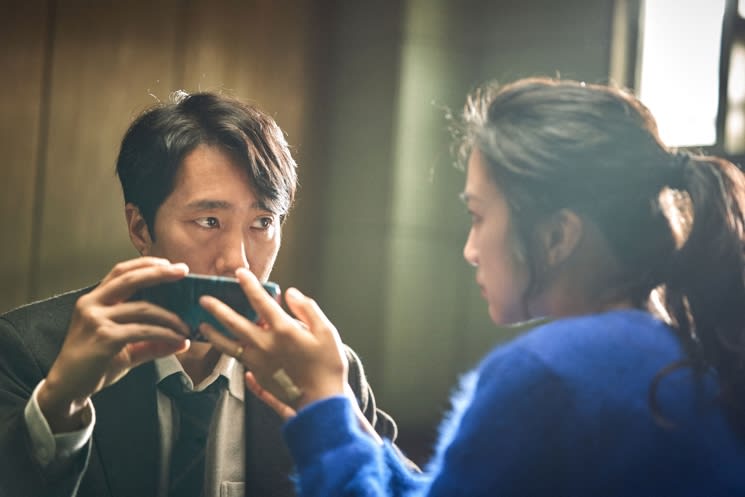Beginning with the image of a man splayed out at the bottom of a mountain, Decision to Leave wastes no time. Although it initially appears that the man jumped to his death, detective Hae-joon (Park Hae-il) begins to suspect that the deceased's wife Seo-rae (Tang Wei) is involved.
At the heart of the film is a peculiar love story between detective and potential suspect. Hae-joon drowns himself in a well of infatuation that threatens his marriage, professional career and sanity; meanwhile, Seo-rae is a mysterious nut that can't be cracked. Both characters are rich with complexity and nuance, which Park and Tang effortlessly explore. It's to their credit that, even when the film's pacing drags, it doesn't completely lose the audience. Park and Tang pick up the slack from any lag in the plot with engaging performances and sparkling chemistry.
Set up as a typical whodunit mystery, Decision to Leave is anything but. Director Park Chan-wook explores the world of obsession, deceit and desire in a way that only the prolific filmmaker can. Using a variety of dynamic camera techniques, director Park, much like he did in his other films, works the fine line between style and substance with grace.
Decision to Leave feels luxurious in its excess. Director Park intentionally elevates each component of the film unnecessarily, but with great success. As a murder mystery, the story would have been compelling on its own — but Park chooses to add extra layers to the plot, creating an in-depth character study. Visually speaking, the skyline and energy of Busan is pleasing enough to the eye to create interesting images and landscapes — but of course, Park ups the ante and uses the camera to add unique movement and perspective.
There's a lot going on in the film without it feeling overbearing or lost in the weeds — every detail is intentional, even when it seems chaotic.
Given all this praise, it's pretty remarkable that Decision to Leave arguably isn't on the same level as Park Chan-wook's previous work. That, however, is more a testament to the director's skills than an indictment of the film itself.
(Mongrel Media)At the heart of the film is a peculiar love story between detective and potential suspect. Hae-joon drowns himself in a well of infatuation that threatens his marriage, professional career and sanity; meanwhile, Seo-rae is a mysterious nut that can't be cracked. Both characters are rich with complexity and nuance, which Park and Tang effortlessly explore. It's to their credit that, even when the film's pacing drags, it doesn't completely lose the audience. Park and Tang pick up the slack from any lag in the plot with engaging performances and sparkling chemistry.
Set up as a typical whodunit mystery, Decision to Leave is anything but. Director Park Chan-wook explores the world of obsession, deceit and desire in a way that only the prolific filmmaker can. Using a variety of dynamic camera techniques, director Park, much like he did in his other films, works the fine line between style and substance with grace.
Decision to Leave feels luxurious in its excess. Director Park intentionally elevates each component of the film unnecessarily, but with great success. As a murder mystery, the story would have been compelling on its own — but Park chooses to add extra layers to the plot, creating an in-depth character study. Visually speaking, the skyline and energy of Busan is pleasing enough to the eye to create interesting images and landscapes — but of course, Park ups the ante and uses the camera to add unique movement and perspective.
There's a lot going on in the film without it feeling overbearing or lost in the weeds — every detail is intentional, even when it seems chaotic.
Given all this praise, it's pretty remarkable that Decision to Leave arguably isn't on the same level as Park Chan-wook's previous work. That, however, is more a testament to the director's skills than an indictment of the film itself.
